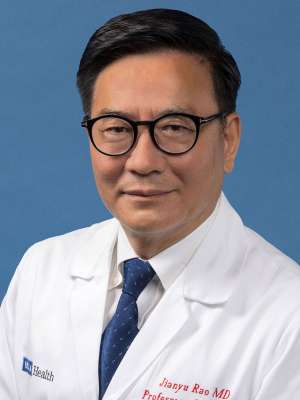
Jianyu Rao, MD
About
Dr. Jianyu Rao is a tenured full professor and vice chair of the department of pathology and laboratory medicine at University of California at Los Angeles (UCLA). In addition to be the vice chair of diagnostic technology innovation, he also currently serves as the chief of cytopathology, the director of international telepathology, and the medical director of Great Los Angeles cytotechnology school. He is a fellow of College of American Pathologist (FCAP), Fellow of Academy of Translational Medicine (FacdTM), Member of Jonsson Comprehensive Cancer Center, and a Member of California Nanosystem Institute. He received many awards, including Physician of the Year award by Wall Street Journal (2005), International Health Professional and Scientist of the Year (2003, 2006), Guangji Scholar by Zhejiang University (2011), and be nominated to Shaw prize in life science and medicine (2010) and Tang prize (2018).
His research focuses on cancer biomarker studies with over 170 peer-reviewed research publications. He has been invited to be a speaker for over 170 meetings and occasions locally, nationally and internationally for topics including cytology, gynecological and urinary tract pathology, cancer biology and therapy, and cancer biomarkers. He is also interested in developing new technologies for pathology especially cytopathology, including imaging and digital analysis, telepathology, nanotechnology, liquid biopsy, and AI-technology. His main clinical expertise includes cytology especially urine cytology, Fine Needle Aspiration service, molecular cytology, gynecological pathology and genitourinary tract pathology.
Languages
Education
Medical Board Certifications
Fellowships
Residency
Degree
Recognitions
- Super doctors, Southern California, 2025
- Super Doctors® Southern California, 2023 - 2025
Locations
Fine Needle Biopsy Clinic
Hospital Affiliations
Research
Interests
- Develop tools for cancer screening and early detection
Dr. Rao's lab is interested in developing tools for cancer screening, early detection, and therapeutic monitoring.
Technical Research Interests:
- Biomarkers for cancer early detection and screening
The research in my laboratory is focused on developing biomarkers that can be used for individual risk assessment, early detection, and therapeutic monitoring of cancer. To reach this goal, we have two specific research areas.
The first area of research is to study the molecular basis of tumor morphogenesis, we focus our effort on investigating how cytoskeletal proteins, specifically the microfilament actin and the associated binding proteins, are altered in tumorigenesis. We hypothesize that since tumor cells have morphological features that are distinctive from normal cells, and since actin family proteins play important roles in regulating cell morphology, adhesion, as well as motility, investigating these protein changes during tumorigenesis will not only provide molecular insight for tumor morphology, but at the same time develop surrogate markers that are more sensitive and specific than morphological analysis alone. Since actin network is regulated by multiple complex oncogenic signal transduction events, including Ras superfamily small G proteins Rac/Rho/Cdc42, and Src family proteins, and many of these proteins have been developed as the potential therapeutic targets, it is possible that an actin centric strategy for cancer detection/monitoring/prevention/therapy can be developed in he future.
Our second area of research is to develop approaches that can be used to detect early malignant lesions, especially cancer of the breast, bladder, and prostate. The detection of low stage malignant and premalignant lesions is essential for the successful halt, or even the reversion of malignant progression through chemoprevention strategy. The focus will be to develop simple, high throughput techniques that can be used to detect expressional abnormalities of multiple genes on a small sample volume basis. One specific example is to develop Quantitative Fluorescence Image Analysis (QFIA) as a single-cell proteomic method for biomarker analysis on cytological materials.
Publications
Insurance
- Aetna
- Anthem Blue Cross
- Blue Shield of California
- Centivo
- Cigna
- First Health
- Health Net of California
- Interplan (part of HealthSmart)
- Medicare Advantage
- MultiPlan
- UFCM Health System
- Prime Health Services
- Private Healthcare Systems (PHCS)
- TRICARE
- UnitedHealthcare
The list of health care plans above may not be comprehensive and could change.
Please contact your benefits coordinator or health insurance company directly to verify coverage.
Visit our health insurance information page for more details.
Recognitions
- Super Doctors® Southern California, 2023 - 2025
